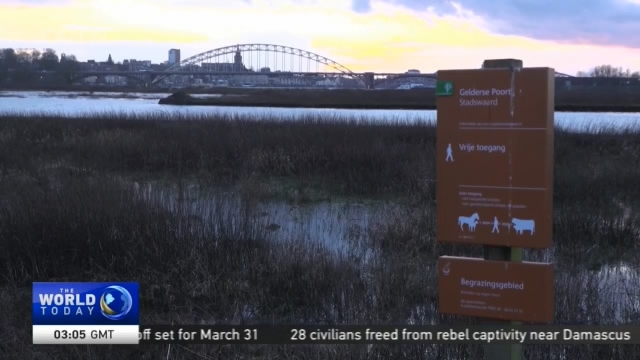
11:22, 27-Mar-2018
Rewilding: Dutch town of Nijmegen: Where the idea began

A controversial conservation idea - once confined to the fringes - is becoming mainstream. It's known as "Re-Wilding". The idea is that humans must urgently do as "little" as possible to save the planet. CGTN's Guy Henderson kicks off our series where it all began: a Dutch town on the Rhine river.
Along the banks of one of Europe's main trade arteries: a wilderness for the 21st century. Once marginal farmland left to "Re-Wild".
"Re-Wilding in principle is giving more space to nature to shape the landscapes of the future."
The man who started what was a pilot project is not so interested in re-creating the past.
But letting the power of nature find a new balance fitting for the times.
WOUTER HELMER RE-WILDING EUROPE "These landscapes better serve our needs for climate adaptation, for flood risk protection. They attract much more eco-tourism than the farming landscapes of the past. All in all, these are very modern landscapes. And besides that, they show an amazing comeback of nature."
Wild grazers like the Konig horse have been imported: similar animals were hunted out in the 16th century.
Give nature a little help to re-complete its cycle, so the theory goes, and it'll take care of the rest itself.
Hundreds of trees -- thousands of species have come back at their own accord.
GUY HENDERSON NIJMEGEN, NETHERLANDS "Humanity has been giving back what it took from the natural world around Nijmegen for the best part of the last 3 decades. Most were highly sceptical about the benefits of 'Re-Wilding' at first. Now many of them accept Wouter Helmer as one of the pioneers of a type of conservation that's only recently begun to take hold across other parts of Europe."
As the concept catches on, nature and humanity are being brought closer. That can also have consequences.
Livestock in the German state of Brandenburg are being killed by wolves which are returning naturally.
Farmer Arno Laube suggests nature's equilibrium isn't his.
ARNO LAUBE GERMAN SHEEP FARMER "It's a question of management. The conservationists need to reconsider their stance. We should be protecting the farm animals, not the wolves."
Wouter believes the balance will wax and wane, that's nature.
The alternative, he argues: is a waste of resources.
"Nature has looked after itself without subsidies for billions of years."
An increasing number of environmentalists, are joining him. GH, CGTN, NIJMEGEN.

SITEMAP
Copyright © 2018 CGTN. Beijing ICP prepared NO.16065310-3
Copyright © 2018 CGTN. Beijing ICP prepared NO.16065310-3